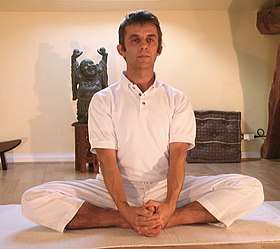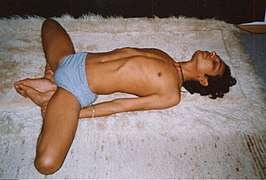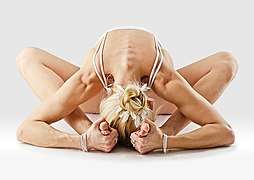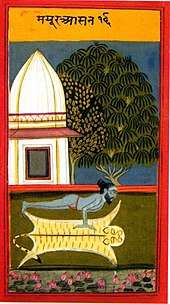Baddha Koṇāsana
Baddha Konasana (Sanskrit: बद्धकोणासन; IAST: baddhakoṇāsana), Bound Angle Pose,[1] Throne Pose,[2] Butterfly Pose,[3] or Cobbler's Pose (after the typical sitting position of Indian cobblers when they work),[4] and historically called Bhadrasana,[2] is a seated asana in hatha yoga and modern yoga as exercise. It is suitable as a meditation seat.[2]

Etymology and origins
The name comes from the Sanskrit words बद्ध, Baddha meaning "bound", कोण, Koṇa meaning "angle",[5] and आसन, Āsana meaning "posture" or "seat".[6]
The name Baddha Konasana is relatively recent, but the pose is medieval, as the meditation seat Bhadrasana (from भद्रा Bhadra, "throne"[7]) is described in the 15th century Haṭha Yoga Pradīpikā 1.53-54.[2]
Description
From sitting position with both the legs outstretched forward, hands by the sides, palms resting on the ground, fingers together pointing forward, the legs are hinged at the knees so the soles of the feet meet. The legs are grasped at the ankles and folded more until the heels reach the perineum. The knees move down to the ground, and with practice reach there; the body is erect and the gaze in front. The asana is held before coming back to the starting position. The thighs are stretched with care. When used for meditation, the hands are placed in Anjali mudra (prayer position) in front of the chest.[8]
It is a strong groin- and hip-opener[9] and one of the few asanas that can be practiced comfortably soon after eating, except for the forward-bending variation with the head on the floor. It is noted in Light on Yoga, citing Grantly Dick Reed's Childbirth Without Fear, that the pose is beneficial to pregnant women, as regular practice reduces pain during delivery.[8] If there is a groin or knee injury, the knees must be supported on folded blankets.[1]
Variations
A common variant is Supta Baddha Koṇasana,[10] Cobbler's Pose in Lying Position, from सुप्त, supta, meaning "supine" or "reclining".
In pregnancy, the pose can be practised reclining as "Wall Butterfly", with the buttocks and feet against a wall, feet together, the knees falling to the sides. The hands can be used to press the knees.[11]
Tarasana, Star Pose, has the body leaning forwards over the clasped feet.[12]
With the thighs supported on folded blankets, 10-pound sandbags may be placed on the inner thigh (near the groin) to assist the stretch.[1]
 Supta Baddha Koṇasana, Reclining Cobbler's Pose
Supta Baddha Koṇasana, Reclining Cobbler's Pose Tarasana, Star Pose
Tarasana, Star Pose
See also
References
- "Bound Angle Pose". Yoga Journal. Archived from the original on 12 May 2011. Retrieved 8 June 2019.
- "How to do Bhadrasana?". The Yoga Institute. 3 August 2018. Retrieved 5 January 2019.
- Owens, Ben. "Baddha Konasana: The Butterfly Pose". Gaia. Retrieved 18 October 2019.
- Claire, Thomas (2003). Yoga for Men: Postures for Healthy, Stress-Free Living. Career Press. p. 170. ISBN 978-1-56414-665-6.
- "Baddha Konasana". Ashtanga Yoga. Archived from the original on 5 April 2011. Retrieved 11 April 2011.
- Sinha, S. C. (1 June 1996). Dictionary of Philosophy. Anmol Publications. p. 18. ISBN 978-81-7041-293-9.
- "Bhadrasana". SivaSakti.com. Retrieved 5 January 2019.
- Iyengar 1991, pp. 128–129.
- Swanson, Ann (2019). Science of yoga : understand the anatomy and physiology to perfect your practice. New York, New York: DK Publishing. p. 50. ISBN 978-1-4654-7935-8. OCLC 1030608283.
- Bhagat (2004). Alternative Therapies. Jaypee Brothers Publishers. p. 40. ISBN 978-81-8061-220-6.
- Lidell, Lucy, The Sivananda Yoga Centre (1983). The book of yoga. Ebury. p. 165. ISBN 978-0-85223-297-2. OCLC 12457963.
- "Tarasana". Yogapedia. Retrieved 4 February 2019.
Sources
- Iyengar, B. K. S. (1991) [1966]. Light on Yoga. London: Thorsons. ISBN 978-0-00-714516-4. OCLC 51315708.CS1 maint: ref=harv (link)
.jpg)
_from_Jogapradipika_1830_(detail).jpg)

